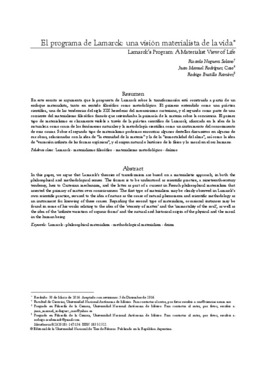El programa de Lamarck : una visión materialista de la vida
Lamarck’s program : a materialist view of life

View/
Date
2018-04-01Author
Noguera Solano, Ricardo; Rodríguez Caso, Juan Manuel; Bustillo Ramírez, RodrigoMetadata
Show full item recordAbstract
En este escrito se argumenta que la propuesta de Lamarck sobre la transformación está construida a partir de un enfoque materialista, tanto en sentido filosófico como metodológico. El primero entendido como una práctica científica, una de las tendencias del siglo XIX herederas del mecanicismo cartesiano, y el segundo como parte de una corriente del materialismo filosófico francés que reivindicaba la primacía de la materia sobre la conciencia. El primer tipo de materialismo es claramente visible a través de la práctica científica de Lamarck, afianzada en la idea de la naturaleza como causa de los fenómenos naturales y la metodología científica como un instrumento del conocimiento de esas causas. Sobre el segundo tipo de materialismo podemos encontrar algunos destellos discursivos en algunas de sus obras, relacionadas con la idea de “la eternidad de la materia” y la de la “inmortalidad del alma”, así como la idea de “variación infinita de las formas orgánicas”, y el origen natural e histórico de lo físico y lo moral en el ser humano. In this paper, we argue that Lamarck’s theories of transformism are based on a materialistic approach, in both the philosophical and methodological senses. The former is to be understood as scientific practice, a nineteenth-century tendency, heir to Cartesian mechanism, and the latter as part of a current in French philosophical materialism that asserted the primacy of matter over consciousness. The first type of materialism may be clearly observed in Lamarck’s own scientific practice, secured to the idea of nature as the cause of natural phenomena and scientific methodology as an instrument for knowing of these causes. Regarding the second type of materialism, occasional instances may be found in some of his works relating to the idea of the ‘eternity of matter’ and the ‘immortality of the soul’, as well as the idea of the ‘infinite variation of organic forms’ and the natural and historical origin of the physical and the moral in the human being.
